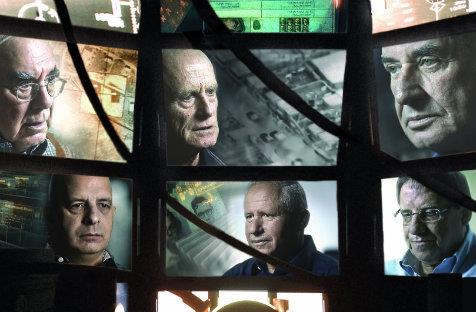The Gatekeepers needs no posturing or preening, gloss or gimmickry to boost its premise; in Dror Moreh’s documentary, the facts speak for themselves. Since the Six-Day War of 1967, Israel’s Shin Bet (also known as Shabak) security agency has been at the forefront of intelligence operations in the occupied territories of the West Bank and Gaza, charged with defending the country against terrorism, espionage and the release of state secrets. The organisation’s heads are among the select few involved in all national security decisions, and are the only members whose identities are known to the general public.
Until now, the leaders of Shin Bet had never been interviewed about their work, let alone filmed doing so. Moreh’s efforts in assembling six surviving former heads of the agency is remarkable as an act of journalism in its own right, his achievement aided by the willingness of Ami Ayalon (holder of the post from 1996 to 2000) to both be involved and assist in securing the participation of others. Of course, the revelations offered by Ayalon and his fellow former commanders – Avraham Shalom (1981 – 86), Yaakov Peri (1988 – 1994), Carmi Gillon (1994 – 1996), Avi Dichter (2000 – 2005), and Yuval Diskin (2005 – 2011) – eclipse the manner of their collection. So too, their extraordinary existence as a record of incendiary events involving an otherwise inscrutable organisation.
Understanding the potency of his retired subjects and their many reluctant secrets, Moreh takes the slow and steady approach. His sophomore directorial effort (following 2008’s Sharon) synthesises the wealth of material available for discussion into seven succinct chapters. The aforementioned war, the Bus 300 hijacking and executions, the invasion of Lebanon, the Oslo accords, the two Intifadas, and the assassinations of Israeli Prime Minister Yitzhak Rabin and Hamas bombmaker Yahya Ayyash are among the matters dissected by those at their centre. Accounts of each are unravelled in unsentimental, matter-of-fact, direct-to-camera recollections, complemented by archival footage and computer-animated re-enactments based on historical photographs and surveillance materials.
Rampant grey areas are immediately evident, with nothing presented as binary – in fitting with Diskin’s opening anecdote that espouses intelligence operatives’ penchant for the former, and politicians’ preference for the latter. Conflict rages not only within the country the six men clandestinely sought to stabilise from the shadows, but in their candid opinions of their actions and of the spy game in general. Pride at successful initiatives combines with sorrow for things gone wrong, uncertainty about a way forward is intertwined with doubt for deeds that can’t be undone, and the triumphs of broad strokes are diminished by the disaster in the details.
Extensive and exhausting, that the Oscar-nominated The Gatekeepers proves troubling is by design, and indicative of its compellingly tumultuous content, not its meticulous construction. In laying bare the inner workings of furtive operations, as well as their lingering legacy, the film probes the intersection of personality, politics, practicality and philosophy; the important, urgent outcome can only be as arresting as it is agitating.
Rating: 4 stars out of 5
The Gatekeepers
Director: Dror Moreh
Israel/France/Germany/Belgium, 2013, 101 mins
Release date: 5 September
Distributor: Madman
Rated: M
Actors:
Director:
Format:
Country:
Release:





